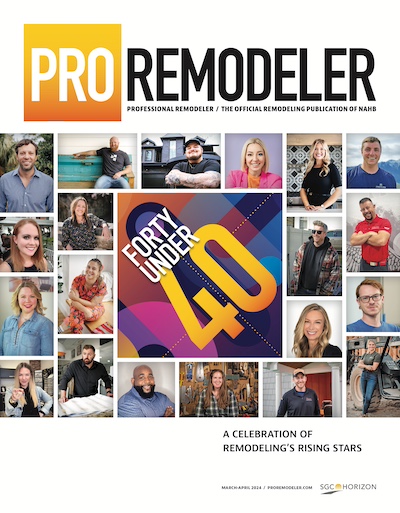|
With benefits such as employer contributions to 401(k) plans and creative ideas such as job-swap days, both E.H. Duncan (Poland, Ohio) and All American Window & Door Co. (Germantown, Wis.) were acknowledged by National Remodeling Quality Award judges last year to have exceptional human-resource policies that enable them to attract and retain the best possible workers.
Half of E.H. Duncan’s 26 employees work in the office; the rest are out on job sites. The field team includes plumbers and HVAC specialists as well as carpenters. The company enjoys a good employee retention rate: Owner and president Tom Duncan says that about one-third of his staff has been with him for 10 years or more.
He credits E.H. Duncan’s 401(k) plan (the company contributes 25 cents on the dollar, up to 6% of the employee’s pay) with playing a significant role in retaining workers. In addition, Duncan offers competitive pay, paid vacation (one to three weeks) and disability insurance. He says providing such a complete compensation package is a good investment in his company, and he keeps that in mind when he prices jobs. "Profit is a must. There can be no security for any employee in any business that does not make money. We get long-term, healthy and good employees who enjoy what they do each day."
Another factor in employees’ job satisfaction is Duncan’s philosophy of family first. He tries to be "pretty open-minded" about any time off his employees might need for their kids. "If someone needs to take a couple of hours off for a school program or something, they just let me know. They can always make up the time later. I’ve never had anyone abuse the system."
Duncan believes in promoting from within, but he also understands that not every field employee can succeed, or even wants to succeed, behind a desk. He has allowed his employees to make the transition to and from both sides.
Many of Duncan’s personnel decisions are based on his 80/20 rule. He expects that at a minimum, his employees will do a good job 80% of the time. Most exceed that ratio and hit 90/10, he says, with a few at 99/1. He finds that invoking the rule also helps resolve disagreements. "If an employee comes to me to complain about another employee, I explain the 80/20," he says. "They understand that. They’ll say, ‘Yeah, 80% of the time, that guy’s great.’ It’s hard to find 80/20s."
At one weekly staff meeting per month, a manufacturer representative updates the department heads on the latest products and installation techniques. Duncan sees these briefings as a way to provide more training for his production employees, who otherwise don’t have many opportunities to expand their knowledge base.
Terri Lodwick, owner of All American Window & Door, uses more formalized methods to train her 12 employees. She gives each one $300 to use for job-related self-improvement each year. In 2002, that money will consist of paid tuition for a class or seminar (each All American employee must attend at least one workshop on customer service or communication each year) and an additional $200 for whatever educational material the employee wants. Those books, audiotapes, CDs and videos become the property of the employee.
Every month, employees have to give state-of-the-company addresses from their perspective. A mandatory element of these meetings is each person’s individual recognition of a fellow employee for something that person did or said. Lodwick says that took awhile to get off the ground; people were self-conscious about giving and receiving public appreciation.
Employees also must admit their biggest mistakes of the month and what they learned from them. Lodwick is willing to accept most errors as long as she knows a lesson was learned, but she uses these discussions to see which problems are repeated, enabling her to address them.
Another innovative exercise at All American is the semiannual job swap. Each employee performs the tasks of another staff member for half a day. For example, the salesmen spend four hours with the receptionist, answering telephones, switching calls to the right people and entering data into the computer. "At the end of the four hours, they were all saying, ‘OK, get me out of here!’" Lodwick says with a laugh.
After the job swap, participants fill out a two-page questionnaire that requires them to think about specific topics, such as the most difficult aspect of the job they just shared and how they can make that person’s job easier.
"I want everyone to understand that we’re a team and we’re all in this together," Lodwick says. "The salesmen are no more important that the installers, and the installers are no more important than the receptionist. You can’t understand what another person does at their job unless you sit with them for four hours and really see it for yourself."
In the course of discussing the company’s vision and their part in it, the employees put together two lists, the top 10 characteristics of a team builder and the top 10 characteristics of a team wrecker, which are now posted in prominent locations throughout All American’s building.
"The lists give employees permission to get in each other’s faces if they aren’t exhibiting the right behavior," Lodwick says. "Now it’s not me against them if there’s a problem. They can talk to each other to resolve it."
If you have questions about how to get started with quality management and improving customer satisfaction, call the NAHB Research Center’s ToolBase Hotline at 800/898-2842 or e-mail toolbase@nahbrc.org.


